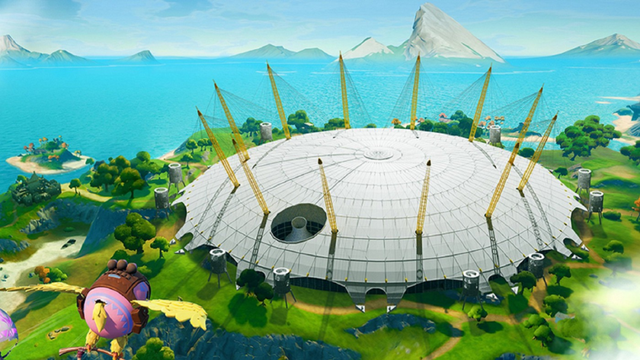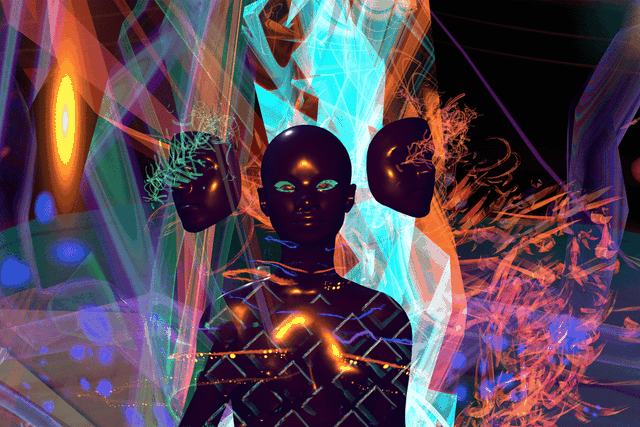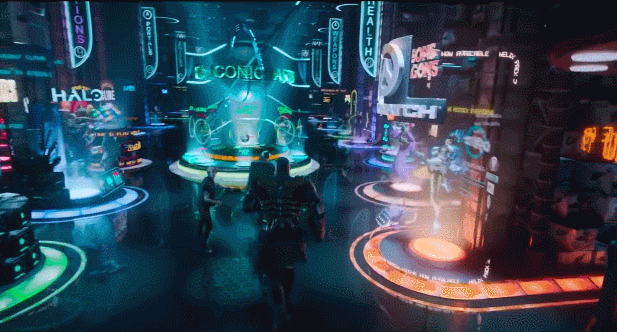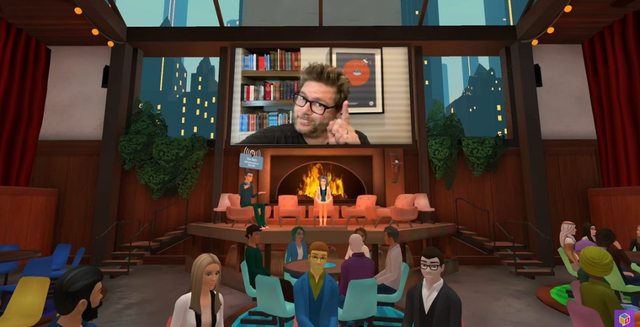Ultima IV is the first game where I want players to respond to what I call moral dilemmas and ethical challenges as they are individuals (rather than like an alter ego). In studying virtue and ethics... in search of ethical allegories Or moral philosophy, Ive come across the concept of the word Avatar in a lot of Hindu texts. In that case, an avatar is a physical manifestation of a god incarnate. Its perfect because I really want to Test your spirit in the field.
—Richard Garriott
Most philosophical traditions and religions can be considered the basic moral requirements of human beings.
The first and most positive aspect of virtual worlds is the potential to give people the experience of the golden rule in action. For example, VR can virtually place people in the body of another.
image description
▼ The Sims, play a virtual you, you can do whatever you want in the game world
Many have described the Metaverse as the next generation of the internet, arguing that it will allow people to access it in a more seamless and engaging way, for example, through glasses or bracelets. It is a virtual world representing the Internet, where people can interact in new ways using digital avatars and advanced technology.
secondary title
01. Human rights dilemma
In the 73 years since the United Nations ratified the Universal Declaration of Human Rights, the world has been unable to agree on what rights should be accorded to human beings.
The idea itself is controversial. The best thing about such idealistic documents is that they limit the most extreme abuses people can suffer, including slavery and economic exploitation.
image description
▼Inception, the world is turned upside down in the virtual dreamland, and I cant control myself
In the Metaverse, as Zuckerberg envisions it, you cant even scratch your virtual nose without permission from a program entirely controlled by the company. There are no standards for virtual worlds, each of them is crafted as a set of technologies known only to the owner.
Moving virtual limbs and looking with virtual eyes is equivalent to moving freely in the virtual world, and people who enter any kind of metaverse world do not have any autonomy. Their every move is at the discretion of the digital control agencies of companies like Meta, which reserve the right to deny anyone freedom of movement.
Considering that the Metaverse doesnt exist yet, it seems silly to worry about this scenario. For now, thats Zuckerbergs imagination, and some critics have reason to believe that none of this will ever happen.
However, the desire to participate in the metaverse of the future—with startling economic opportunities envisioned in every press release these days—suggests that many social activities may be sucked into virtual worlds, in whole or in part. When this happens, people are either engaged or disenfranchised.
Every identity in the virtual world is the creation of a private database over which the individual has no control. They can pick from a menu, and in Zuckerbergs world, maybe they can even suggest whats on the menu. But at the end of the day, people dont have veto power, and the companys decision is final.
image description
▼You can do anything you want in the metaverse, but you cant control it
Its a bit like dreaming while sleeping, dreaming of falling into a dark abyss, like struggling but being powerless. In the metaverse, if your entire existence, and who you think you are, could be taken away by a corporation.
People dont really exist in social media, and they dont exist in the metaverse. Their identities are a figment of the database, and people enter things into web forms and they have the illusion that they have identities. Without control and autonomy, they dont have any meaningful identity, they are just pawns for the database owner.
Likewise, any behavior in the world of the Metaverse would be an illusion of autonomy and bodily integrity, and corporations with databases still control the virtual air people breathe in the Metaverse.
image description
secondary title
02. Mirror world
The metaverse is not just a term in Neil Stephensons science fiction novels, real virtual worlds are being constructed today.
In 2019, Kevin Kelly of Wired magazine wrote a cover story titled Welcome to the Mirror World. In it, he describes how augmented reality will inspire the next big tech platform.
image description
▼The metaverse is like a mirror world, your avatar is shaking hands with you
So what happens when the world becomes a billboard, when robots have spatial reasoning, and virtual assistants own relationships with consumers?
Today, the metaverse world is a shared virtual space where people are represented by digital avatars (think Ready Player One), and the virtual world is constantly growing and evolving according to the decisions and actions of the society within it.
Eventually, with the help of augmented and mixed reality, people will be able to enter virtual worlds completely virtually (that is, using virtual reality), or interact with parts of them in their physical spaces.
Leslie Shannon, Head of Trend Scouting at Nokia, mentioned the importance of the metaverse, or Internet of Space, in a recent presentation during the VRARA Global Summit.
image description
▼Virtual iceberg, metaverse is like space Internet
Marketing and communications professionals need to pay attention to the Metaverse because it is the next frontier of online interaction. Just as social media revolutionized the online marketing landscape, so will the Metaverse. While we dont currently have a shared metaverse, there are a few companies working on creating it.
Just like Fortnite, Minecraft, and AnimalCrossing are games now, but they already have huge user bases, concrete worlds, and user-generated content. Niantic, Magic Leap, Microsoft, and many others are also working on it.
secondary title
03. The technology itself
These are tricky times for 21st century ethics.
image description
▼O2 and the vast music plaza
The market economy follows the same logic: as long as the law is respected, no consumers are physically harmed in the process, and ones path to profit has nothing to do with others.
As digital technologies become an integral part of our everyday lives, there is a need to consider the less obvious long-term impacts of innovation, as recognized in the technology ecosystem including artificial intelligence and robotics.
The growing presence of Meta companies in the immersive tech ecosystem has come as a shock to many. As the controversial tech giant steadily paves the way to mass-market dominance with hardware and platform breakthroughs, an uneasy doubt looms: Is our immersive future in our hands?
The answer is far from simple. The key issue isnt just Meta, or the rest of GAFAM, or any other VR/AR company itself. It starts with the technology itself.
image description
▼ Beyond the universe, people interact through digital avatars
The idea of transcending the human condition is as old as humanity itself, but heres a twist: the escape enabled by virtual worlds is stronger than ever. With just the right visual and auditory stimuli, our brains can be tricked into experiencing something real, even though we know it isnt.
In addition to the usual ethical challenges associated with gaming (violence, addiction, physical neglect, etc.), we are dealing with a breakthrough technology that, by blurring the line between the medium and the user, makes the latter identify with his/her virtual life in on a profound level.
Invoking the idea of the amoeba effect, in which users adjust their behavior based on the appearance of their avatars, our virtual selves may gradually merge and reshape our real identities.
image description
▼The combination of metaverse and fashion brings new inspiration for brand design
Once adopted on a mass scale, virtual reality will fuel a larger trend: digital technology redefining what it means to be human.
If all goes well, we can imagine a future where the ultimate dream comes true: a Metaverse that unleashes our creativity, reduces inequality, and lets us finally experience the thrill of “real” social interaction online.
At the same time, it’s hard to ignore dystopian scenarios in which the presence of virtual intermediaries numbs users’ feelings for others and/or lures them to abandon the physical world entirely.
The fact that the actual future is likely to be a combination of the two is enough to suggest that, as an industry, we might want to take ethical issues in the metaverse more seriously.
secondary title
04. Rewire human cognition
If we apply Robert Nozicks classic 1974 experience machine thought experiment to a contemporary context, the key existential question on the agenda is no longer Do humans want to be plugged into pleasure machines forever? programming machines in a way that protects our humanity?
image description
▼The last 3 days of Mind Labyrinth VR Dreams
So far, the (almost unlimited) power to craft an immersive future has been delegated to private actors, and here are several reasons.
First, money is involved. As explained in Kent Bye’s 2019 XR Manifesto, tech companies’ fiduciary duties to their shareholders often conflict with their respective duties to users.
This corporate paradigm becomes especially questionable from a legal and ethical standpoint when the experience being sold rewires human cognition and the key commodity traded is the user’s private data.
According to Silicon Valley “whistleblowers” such as Tristan Harris, in the recent Social Dilemma documentary, social platforms have been purposefully employing manipulative design choices to maximize engagement, often at the expense of mental health and exacerbating social polarization differentiated at a cost.
We have no reason to believe that things will be much different in the Social Metaverse, in fact quite the opposite.
image description
▼ Player One, run in the virtual game
The fact that Meta requires account-linked logins for the Oculus Quest 2 proves that this new kind of data is a real gold mine for ad-reliant tech companies, and an equally big privacy threat for users.
In fact, according to a recent study from Stanford Universitys Virtual Human-Computer Interaction Lab, the kind of data collected through immersive experiences may be more difficult to anonymize than previously thought.
Clearly, the business models and privacy frameworks inherent in “surveillance capitalism” need to be challenged, at least to some extent, if we are to innovate responsibly in the Metaverse.
In addition to questioning the ethics of a growth-oriented business mindset, we might want to examine other values that drive the people who make tech products.
If we assume (and the evidence tells us we should) that frontier technologies exist (i.e. can redefine the way we live), then it is only reasonable to ask the ideology of their creators. The regrettable case of AI bias alone is enough to inspire serious investigation.
image description
▼Mother meets entertainment of her dead child in VR
Far from humanitarian doctrine in a self-reinforcing social bubble, techno-revolutionaries are so driven to outperform their competitors and deliver innovation at any cost that they end up ignoring some of the fundamentals that need to be considered for the sake of society as a whole.
However, this moral myopia can be compensated by a proper corporate culture. Today, most tech employees simply dont have enough resources and guidance to engage in meaningful deliberation around ethical challenges.
For example, they could benefit from greater exposure to outsiders, especially from academia and other industries experienced in dealing with existential dilemmas.
Because of its novelty and rapid pace of development, metaverse innovation is a complex beast that cannot be tamed by industry giants single-handedly. Ethical standards should ultimately be shaped by multiple voices within and outside the ecosystem to ensure comprehensiveness and fairness.
image description
▼Metaverse, the latest lifestyle
Figuring out how to democratize big data in a way that makes sense financially and ethically is equally complex, but the challenge shouldnt discourage us.
Ethics offers us an opportunity to better understand the world, to start asking the right questions, and to co-develop new frameworks for thinking about ethics.
In the process, we may need to move away from our individualistic mindset and remember that collective wisdom has been the best thing we are doing right.























